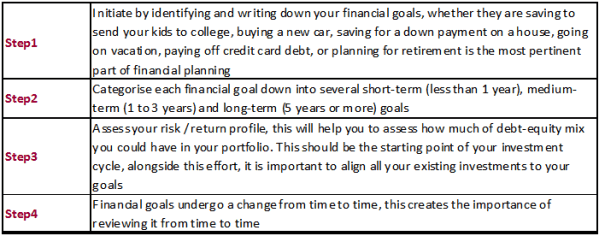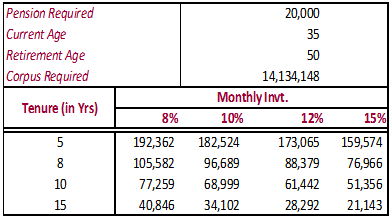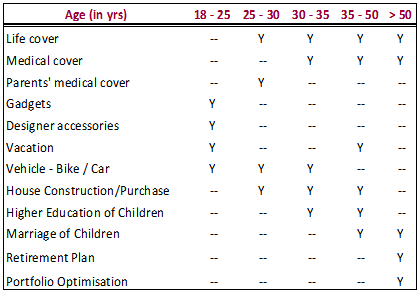Photographs: Rediff Archives Anil Rego
Let go of the past and go for the future. Go confidently in the direction of your dreams. Live the life you imagined: Henry David Thoreau
Planning your finances well on your own can lead to achieving your dreams in a hassle-free manner. In retrospect, it wouldn't have been too far off when your parents' or grandparents' had to scramble at the last minute to meet a need which was to occur in all certainty. For example, stories like parents having to take loans against property / gold to educate their son / daughter. Such events could clearly be avoided if one had planned their finances. Money is an integral part of life; to satisfy any material need, finances come into play.
There are many more such reasons in favour of planning your finances.
Need to plan your finances
1. Emergencies
Emergencies are events that are uncertain, including the timing. Although one cannot anticipate the type of emergency -- medical, job loss, home front etc., it is better to set aside certain funds specifically to cater to contingencies. Typically, one would look at maintaining three months of household budget in savings / fixed deposits and an additional three months of household expenses in high liquid avenues such as liquid plus funds, floating rate funds etc.
In addition, a good chunk in equity mutual funds could also help during adverse situations such as these.
2. Hedging your life / health risk
The first step towards financial planning is essentially hedging of risk; if you are the sole breadwinner for the family, then it is essential to evaluate how much your family would require in the case of an eventuality. All earning members of the family should undergo the human life value calculation to assess the amount of cover needed.
Similarly, medical expenses are on the rise and one has to ensure that such risks are appropriately covered, availing an individual cover or family cover would take care of this aspect.
Click NEXT for more
4 easy steps to financial planning
Photographs: Rediff Archives
3. Optimising returns at risk adjusted levels
Every individual's risk / return profile differs and could be broadly based on the approach to investing, age, financial goals etc. There is only a certain amount of downside on investment that each of us can stomach. Often, individuals indulge in equity investments excessively, without appropriately evaluating the risk / return profile and later regret it.
Financial planning involves appropriate diversification which will ensure that one achieves optimal returns at risk adjusted levels.
4. Tax planning
This is an annual ritual which by far has been conducted by all of us in the most haphazard manner. Efficient tax planning can leave a lot of excess money on a monthly basis which can be used for investing and essentially building the corpus. Tax planning is also an essential part of optimisation of returns.
The below picture tries to capture the need to plan for your finances and the methodology one should adopt to achieve optimal financial planning.
Click NEXT for more
4 easy steps to financial planning
Photographs: Rediff Archives
Importance of goal setting
On the one hand one may have to scramble to meet needs which are likely to arise with all certainty and on the other hand, one could end up putting all eggs in one avenue thus hampering the long term objective of optimization of portfolio. Thus, the need for a systematic approach to chalking out financial goals.
Given here are four steps that will help individuals plan their finances.

The early you start, the more efficiently you can plan. This is simply because of the rule of compounding. If you have more number of years' to plan for, the amount you set aside for your need would be that much lower, as evident in the below table. In addition, as far as the returns you generate on your investments is concerned, compounding could be a clear game changer.

Click NEXT for more
4 easy steps to financial planning
Photographs: Rediff Archives
Assessing your goals
With passing time, needs could change or they acquire a new meaning with passing time and on achievement of personal goals. If you were to introspect, your needs as a college student would have undergone a sea of change and now you would have much different needs. Here's a look at a how things change for various individuals:

This is not a sacrosanct table of needs mapped to a#8805 it is just a sample of what people generally aim for at different points of life. Identifying your needs is only half the work done, quantifying them and aligning them with timelines will enable one to remain focused on the destination. Whilst executing the plan, one is required to take care of other nuances such as inflation, real returns, cost escalation etc.
4 easy steps to financial planning
Photographs: Rediff Archives
A typical need-table for a 35-year-old could look like this:

Financial planning is not a one-time effort; consistent monitoring and re-aligning will be required to achieve 'Optimal risk adjusted returns'. It's best to start early and of course, anytime is a good time to start!
Tips for financial planning:
- Plan for all the certain events in life
- Include planning for emergency, tax optimisation, hedging of risk / return
- Financial planning should also take care of planning your liabilities
- Chalk your financial goals, align them to timelines and quantify them
- Take care of inflation, real returns, taxability etc., whilst planning your investments



Comment
article